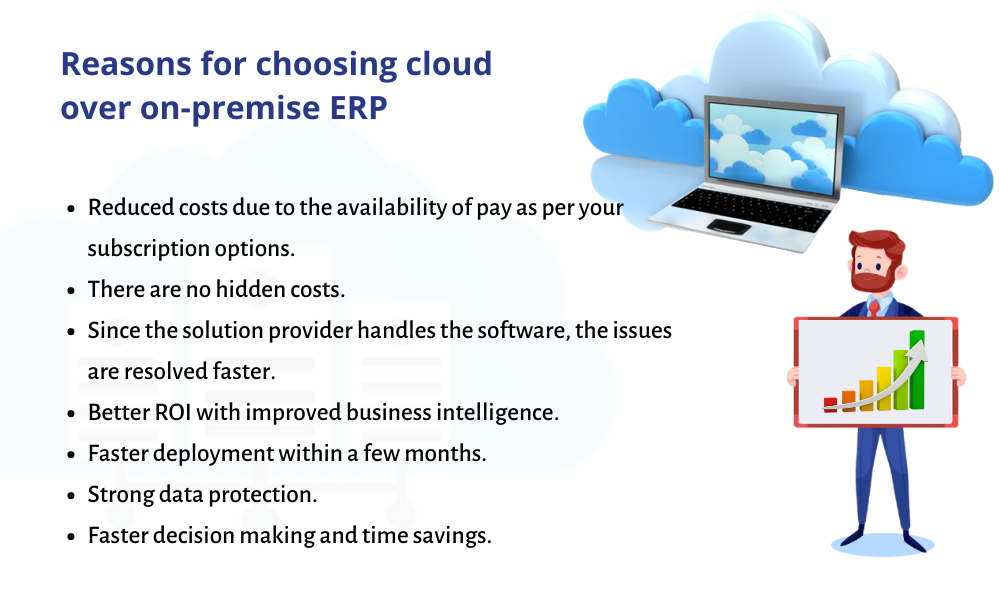Cloud ERP or On-premises ERP, which is best for your company ? This is a very common question around business people. When it’s the time for choosing the right ERP for your company, there are lots & lots of questions and research that needs to be done. Everyone might have heard that cloud platforms are growing faster than ever before. It is being used by a number of companies in recent times. Before making any decisions it is the right thing to study on each platform completely and choose the best suited technology for your business.
Difference between cloud and on premises

Cost :
A cloud based ERP software is hosted on the vendor’s server. There are no big investments you need and all you have to pay is the subscription fees. No need for additional infrastructures as it is deployed to your existing systems.
On-premises ERP software requires an additional investment on the server and needs a separate and individual number of hardware to install the applications. To manage the software you will need an internal IT team which adds more cost to the system.
Deployment :
The implementation process for a cloud based software requires no additional hardware resources and hence the deployment time is less.
The on-premise deployment process is more compared to cloud tools as here the ERP is installed locally on your computer’s server. It may take more time depending upon your current infrastructure and IT team.
Accessibility :
The cloud platform is very popular because of its flexibility and mobility where a user can access the data from anywhere, anytime and through any device with just an internet connection. This gives more control over your business activities.
On-premise ERP lacks this feature as the systems do not have remote access and hence it is not possible to access your business data while away from your office.
Data Security :
Since cloud ERP systems are maintained by service providers, they have better control over the malfunction issues and enhanced security protocols. Thus preventing any interruptions in day to day business operations.
The security of data in case of on-premises software completely depends upon the efficiency of internal IT teams. Hence if they are not well equipped and skilled, then the data might be at risk.
Scalability :
Scalability refers to how well the software is capable to support in times of business expansion. A cloud ERP system well suits this requirement and efficiently handles any size of data and users. The on premises ERP when it comes to handling more operations then increasing the hardware count is the best solution which again results in more cost.
Maintenance and Software Upgrade :
Since the cloud ERP is managed by a software vendor, you do not need an internal team to maintain or upgrade the software. This is taken care of by the solution provider and make sure you work on the latest version.
On-premise ERP system requires a full time IT team to maintain the software application and updates.
Advantages and Disadvantages of On-premises & Cloud ERP
1.On-premises ERP Software:
Advantages –
Data Control : ERP software contains a large volume of company’s business data. On-premise hosting gives you the control over the data and updates the information as needed.
Less Vendor Dependency : Since the on-premise software uses its own server, you need not depend upon the vendors for each upgrade or any issues.
Disadvantages –
Longer implementation time : The duration of implementation is increased as it requires training the existing team to deploy the software.
Lack of flexibility : Since on premises software has limited access, you can only do your work within the office space.
2.Cloud ERP Software :
Advantages –
Quick Implementation : Cloud tool does not require any additional hardware or infrastructures and hence the implementation is quicker.
Accessibility : Cloud ERP supports quick upgrades and features which in turn helps with more accessibility and functionalities.
Data security : Cloud ERP has a centralized database to store all the data and ensures multi level protection. Also prevents data duplication.
Vendor managed servers : Since the cloud system is managed by the solution provider, the regular server maintenance is done by them.
Disadvantages –
Lack of ownership : Even though the cloud ERP gets regular updates on latest versions, sometimes the employees might find it convenient to work with old ones and feel difficult to adapt to the change.
Dependency on connectivity : Cloud tools work only with consistent internet connections. Hence lack of stable connection causes issues with smooth running of updating business activities.
Reasons for choosing cloud over on-premise ERP to your businesses :
- Reduced costs due to the availability of pay as per your subscription options.
- There are no hidden costs.
- Since the solution provider handles the software, the issues are resolved faster.
- Better ROI with improved business intelligence and real time insights.
- Faster deployment within a few months.
- Strong data protection.
- Access from anywhere and anytime.
- Faster decision making and time savings.

Conclusion :
Choosing the right ERP for your business needs might be a crucial task since there are plenty of options available in the market with various platforms as well. But taking the right decision should only rely on the fact that, which ERP software helps your business to get the most outcomes.
Some Cloud Facts around the Internet :
- The worldwide cloud users are about 1.6 billion
- By moving to cloud technology 90% of companies saw at least one area of improvement.
- For small businesses the cloud technology is 40 times more cost effective than their own IT system.
- 82% of the companies who switched to clouds have saved a huge amount of money.
- By 2022, global cloud app spending will reach $226.9 billion and cloud platform services will reach $70 billion.
- An international survey of ERP users indicated 64% of companies use SaaS, 21% use cloud ERP and only 15% using on-premises.
- Cloud deployments account for 44% of all implementations for survey respondents in manufacturing and distribution.
- More than half (53%) of organizations with ERP software use cloud-based solutions rather than on-premise enterprise platforms.



